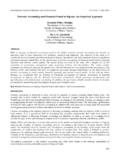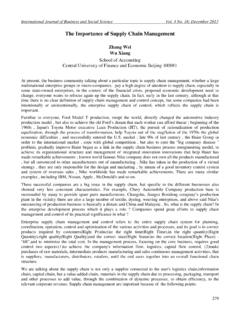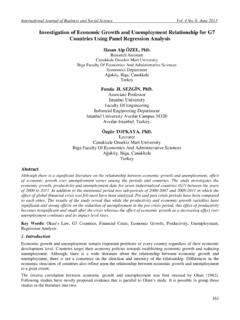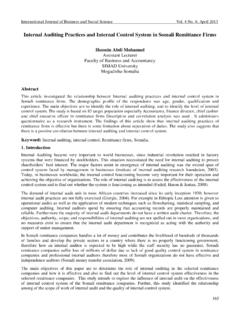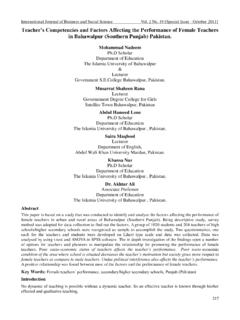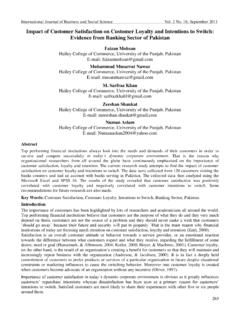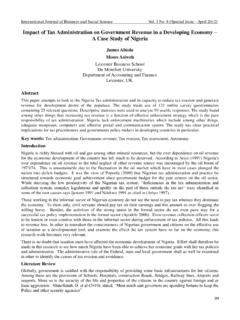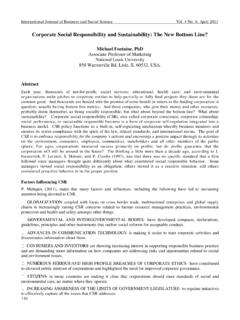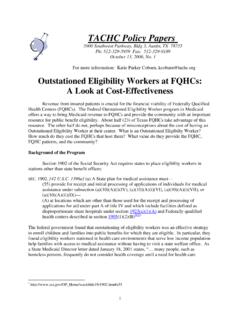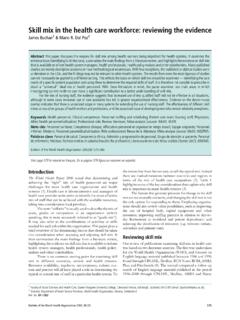Transcription of Transformational Leadership and Its Predictive Effects on ...
1 International Journal of Business and Social Science Vol. 3 No. 7; April 2012. Transformational Leadership and Its Predictive Effects on Leadership effectiveness Amir Sadeghi Department of Foundation of Education Faculty of Educational Studies University Putra Malaysia 43400 UPM, Serdang, Selangor Darul Ehsan Malaysia. Zaidatol Akmaliah Lope Pihie Department of Science and Technical Education Faculty of Educational Studies University Putra Malaysia 43400 UPM, Serdang, Selangor Darul Ehsan Malaysia. Abstract Academic departments play an important role in the success of institutions of higher education and success of departments directly depends on effectiveness of their head. This study is an attempt to determine heads of academic departments' Leadership styles and its relationship with Leadership effectiveness at Malaysian Research Universities (RUs).
2 Using Multifactor Leadership Questionnaire 5x (MLQ), the study employed 298 lecturers of three Malaysian RUs. Results indicated that lecturers perceived the heads of departments exhibited combination of Transformational , transactional, and laissez-faire Leadership styles. The result of regression analysis demonstrated that contingent reward, idealized influence (attribute), inspirational motivation, individualized consideration, laissez-faire, intellectual stimulation, and management-by-exception active are significant predictors of Leadership effectiveness . These factors accounted for 82% of the variance in Leadership effectiveness . In addition, the results suggest that contingent reward has important Effects on Leadership effectiveness . The implications of the research findings are discussed.
3 Key words: Transformational Leadership , Leadership effectiveness , higher education, head of academic department 1. Introduction World is changing more quickly than whatever we can imagine. Malaysia as a developing country is faced with different challenges of changing world. To be confronted with challenges of 21st century the Malaysian government has set out an ambitious vision for the country, namely vision 2020, which based on that, the country should be a fully developed nation by 2020. One of the sectors that has strategic role to materialize this vision is higher education (National Higher Education Action Plan, 2007). Transforming Malaysia to an international center of higher education excellence is the most important mission of higher education (Malaysia Ministry of Education, 2008; National Higher Education Action Plan, 2007).
4 To facilitate process of transformation and achieve its goals, Ministry of Higher Education has selected four public universities as Research University. They have been selected to be at the forefront of quality research and teaching (National Higher Education Action Plan, 2007). To materialize the mission of higher education, university administrators have key role, to be dealt with challenges they must adopt effective Leadership styles to direct their organizations effectively. University administrators are key decision makers, and their quality of decision will result in obtaining the organizational objectives successfully (Verma, 2000). Academic departments play an important role in the success of institutions of higher education. They are established to develop, preserve and transmit knowledge.
5 It is believed that the success of each higher education institution is measured by the success of its departments (Coats, 2000). Heads of departments are the first line leaders who directly influence the quality of their departments (Bowman, 2002; Williams, 2001). 186. Centre for Promoting Ideas, USA The heads of departments duties comprise a wide spectrum of tasks, these may include managing the department finances, implementing departmental bylaws and rules to duties such as curricular changes, conducting lecturers evaluation, promotion and tenure processes, employing new lecturers and staff, maintaining proper records about lecturers, staff, and students, administrating and supervising scholarship and assistantship support for students, supervising grants and agreements, and finally organizing department s general activities such as faculty meetings and social events (Thomas & Schuh, 2004).
6 Moreover, heads of departments have to play the important role of facilitating the process of change in their departments (McArthur, 2002). Concentrating on this role, heads of departments in Malaysian RUs can act as effective agents of transforming Malaysian higher education institutions to world class institutions. Research and literature about top level of management in higher education is relatively abundant, however, despite importance of head of department s position in institutions of higher education, there have been a small number of studies addressing the attributes of successful department head (Coats, 2000, Williams, 2001). Consequently, there is a knowledge gap related to the position of heads of departments particularly their Leadership role in the literature, which suggests that the subject should be considered more closely by researchers.
7 Leadership is the important factor that has ability to manage change in organizations (Sarros & Santora, 2001); it is one of the most important needs for success of each organization (Murphy & Ensher, 2008). Leadership can be defined as the ability to inspire confidence and support among the people who are needed to achieve organizational goals (DuBrin, 2007, ). Leaders can direct human resources toward the strategic objectives of the organization and ensure that organizational functions are in line with the external environment (Zaccaro &. Klimoski, 2001). Furthermore, predicting the future probabilities and planning choice strategies to satisfy uncertainties are capabilities of effective leaders (Riaz & Haider, 2010). They can lead organizations to success by paying more attention to environmental changes, which in turn helps them set proper goals and objectives.
8 One of the most important elements of Leadership that contributes to Leadership effectiveness is the style of the leader. A Leadership style is the behavior a leader exhibits while guiding organizational members in appropriate directions (Certo & Certo, 2006). Leaders improve their style over a period of time due to experience, education, and training. For many years, researchers have tried to explain how leaders style or behavior relates to effectiveness (Dessler, 2004). Transformational Leadership has been demonstrated as an effective Leadership style in leading organization (Felfe & Schyns, 2004), it has great Effects on subordinates behavior and organizational outcomes (Tickle et al, 2005; Bommer et al, 2004). The main purpose of this research is to investigate that a combination of Transformational , transactional, and laissez-faire Leadership dimensions has more Predictive effect on perceived Leadership effectiveness than each Leadership style alone.
9 2. Theoretical Background Transformational Leadership By combining trait, behavioral, and contingency approaches of Leadership , one of the new integrative Leadership theories, namely Transformational Leadership was developed (Abu Daud Silong, 2009; Lussier & Achua, 2007). The concepts of Transformational and transactional Leadership are among the most popular and current approaches to understanding leader effectiveness . It was developed in 1978 by Burns (Hinkin & Schriesheim, 2008). Bass (1985) built new version of Transformational Leadership on Burn s work and then Bass and Avolio (1994, 1997). proposed full-range theory of Leadership consists of Transformational , transactional, and laissez-faire (Antonakis & Atwater, 2002). Transformational leaders encourage follower to do more than required (Sosik et al, 2002), are proactive and help followers to attain unexpected goals (Antonakis et al, 2003), they move followers beyond immediate self interest (Bass, 1999).
10 The Transformational leaders engage in a particular set of behaviors. They are models of integrity and fairness, set clear goals, have high expectations, provide support and recognition, stir the emotions and passions of people, and get people to look beyond their self-interest to reach for the improbable (Pierce &. Newstorm, 2008; Bass, 1985). Transformational Leadership focuses on social values and appears in times of distress and change (Bass, 1985). This type of Leadership is an important antecedent to construct the collective confidence or strength required by groups to be successful when facing with difficult challenges (Bass et al, 2003). 187. International Journal of Business and Social Science Vol. 3 No. 7; April 2012. Transformational leaders can create significant organizational change and act as change agents, foster higher level of intrinsic motivation, and loyalty among followers, introduce a new image or view of the future and create a commitment to this image among followers (Kinicki & Kreitner, 2008; Noorshahi & Yamani Dozi Sarkhabi, 2008).
